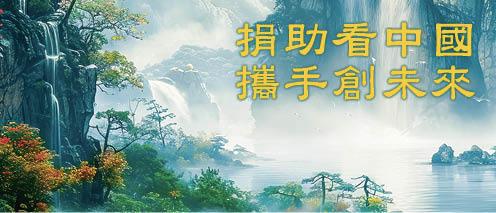張雨辰(譯音)先生,一名中共黨員,北京建委的一位前官員,最近在首都北京的市郊,為自己造了一座宅邸;它是塞納河上一座17世紀法國古堡的翻版,其側翼的原形,則是楓丹白露和凡爾塞宮的花園。它的造價為5000萬美元,為清出建宅的場地,他毀了800個農民的家。
柳傳志先生,西安某軍事院校的一名畢業生,聯想-中國最大的電腦企業-的創建者,最近以12.5億美元的價格,購併了IBM的PC分支-這信息劃時代的象徵物。距我家不遠的地方,一家商號在今年聖誕節裡,出售著來自上海的絲巾,漂亮,又便宜;如果你想買部數碼相機送人,它也可能來自於上海。
中國人,中國的幣,中國的產品,如今是觸目皆是了。故找尋新年之主題的學究們,便洋洋萬言,預測今後的中國,將成為全球的霸主。偉大的威廉 .裡茲.莫格,這做預言從不怕閃舌頭的《泰晤士報》前編輯,稱這眼前的世紀,「似將成為中國的世紀」。前外交官耶利米 .格侖斯妥克爵士,則在《今天》節目裡斷言說:「中國這龐然大物,正日漸出現於我們的地平線上。」說這話的口吻,令人想起電影《獨立日》中的巨怪。
這「人民的共和國」,有人不斷提醒我們在外資的湧入下,一直保持著每年9%的增速。到如今,它已是僅次於美國的第二大「國民經濟體」(以「購買力評價標準」測算),不久將超過整個歐盟。它有一個繁榮的「中產」人數達一億人,其中多數掛在網上,而像張雨辰、柳傳志這樣的闊小子,又至少有一千萬個,每人的家產,都在一千萬美金以上。今每個中國人發大財的企業,無不摧毀著美國與歐盟人的飯碗;而中國賺來的美鈔,又投資於美國的國債,這使中國在全球的經濟事務中,有了一張「王牌」。因此這個十年,或下個十年,中國必是世界的霸主。
噢,是的?記得80年代,我曾往來於大陸、臺灣和日本。東京旅館的書攤上,擺滿了美國「半仙」們的大部頭預言,稱以日本這神話般的工業,這無敵的金融,下世紀的日本,必將是全球的巨人。但日本股市塌了之後-89年底,並且一塌不再起了-,這些書就被艚不拉唧地撤了書架,這一類預言,也不再聞之。
因此中國的「強」,恐也非「擋不住的趨勢」。首先,它目前的增長率,還遠不是「可持久的」;因為它依賴的,是象徵性的工資,腐敗,近於烏有的環保措施,和一個往最好處說是危險的,往最壞處講是已崩潰(按西方的標準)的金融體系。其次,如比爾 .埃蒙特2003年寫的,今日的中國,至多是一個「中等國家」,其國民人均產值與它的鄰居如南韓比,則只是小巫,僅與烏克蘭相當而已。
雖然以人口論,中國倒遠不是「中等的國家」,但人口與之有一比的印度,在技術、武器等方面,卻已稱雄於全球了,20年內超過中國,在印度恐不是難事。
再說中國還有十億人,並未成為這經濟奇蹟的一部分。他們和被張雨辰趕出家園的人一樣,是些失業的、或低就業的農民。他們改善生活的唯一希望,是透過張家豪宅的籬笆,偷窺一眼裡面的生活,然後坐等進城出賣血汗的兒女寄錢來,支付贍養的費用。這貧富分裂的鴻溝,是不可以持久的。
最後我要說的是,錢並不能解決一切。張先生或有能力買一所豪宅,但在世界的第一張圓桌邊上,錢卻不易買到一個位置。如60年代,當戴高樂總統第一次見到身材如「三寸釘」的日本總理時,便不屑地問:「那個晶體管推銷員是誰?」
說實話,超級大國的地位,固然為經濟有關,但也與文化、教育、科學、軍事、和政治格局有關。
「超級大國」之為物也,是迫使或勸說別的國家願意和你一樣,-這一點,英國,法國,蘇聯,和美國在其各自稱雄的時代,在各自的勢力範圍內,已基本上做到了。但你聽說過有哪個國家的億萬富翁,願意在巴黎市郊造一所中國式的古亭嗎?中國培養了一大批取法西洋傳統的樂師,比如暢銷的郎郎。但有幾個歐洲樂師取法別人的傳統呢?本雜誌的讀者中,可有幾個愛聽京戲的?你可能愛吃中國菜,甚至蹩進電影院裡,看那異國情調的《英雄》,但據本週的調查,英國人最不願意去的五個國家裡,中國居其一。從更寬泛的文化意義上講,是中國願意效法西方,而不是相反。
再以諾貝爾獎論,受大陸教育而獲獎的,人數是零。而自1980年以來,單單是加州大學,就出了15位諾貝爾獎得主。古代中國是一偉大而燦爛的文明,今天則不是。
再從國際政治說,這次印度洋海嘯,中國政府撥的援助款為三千一百萬美圓,僅為英國公眾之捐款的一半,為日本的一個零頭。假如中國是這一地區的領袖,那中國這時就應走到前臺,而實際走到前臺的,這回又是小布希。以至中國對繼續中的伊拉克戰爭的態度如何,人們都懶得過問了。
其他方面如健康、醫療、教育,如鏟除貧苦的戰爭。三億人富了,十億人成了失敗者。在全球變暖的問題上,中國簽署了東京議定書,如今卻仍然是最冒犯地球的國家之一。隨著其工業能力的增長,這一點越來越壞。
它如今其實已是一個巨大的環境災區了,這是每一個最近去過中國的人有目共睹的。援引中央情報局本年度的報告,這些災難有「大氣污染;水源短缺;水污染;沙漠化」等等。
我還有許多理由敢打這個惡賭:中國經濟的騰飛是有限度的,過此即難以為繼。我們願張先生和柳先生過一個富有的春節,但我們不要混淆暴發戶的熱線與世界領袖的地位。
22 January 2005: Spectator: This link is to a subscription-only website
By Martin Vandeer Wylder
Mr Zhang Yuchen, a Communist party member and former official of Beijing』s municipal construction bureau, has just built himself a new house in the suburbs of the Chinese capital: it is a replica of the 17th-century Château Maisons-Lafitte on the Seine, enhanced with wings copied from Fontainebleau and gardens based on Versailles. It cost him $50 million, and he displaced 800 peasant farmers to clear the site.
Meanwhile, Mr Liu Chuanzhi - a graduate of Xian military college, a former nominee for Time magazine』s 『25 Most Influential Global Executives』, and the founder of Lenovo, China』s biggest computer business - has just acquired for $1.25 billion the division of IBM which makes PCs, an iconic product of the technology age. Closer to home, my Christmas shopping this year consisted largely of bargain-priced but beautiful silk scarves from Shanghai; if I had bought anyone a digital camera it would probably have come from there too, and if I had fulfilled my secret urge and bought myself a Hornby 『Hogwarts Express』 train set, it would have come from a factory in Guangdong.
The Chinese, their money and their manufactured goods are everywhere, and pundits in search of New Year themes have been full of predictions about China as the coming global power. The great William Rees-Mogg, never one to hold back from a bold forecast, says this 『is beginning to look like the Chinese century』. The former diplomat Sir Jeremy Greenstock, on the Today programme, spoke of China as 『an increasingly large presence on our horizon』, conjuring the image of those huge alien spaceships that loomed over the world in the film Independence Day.
The People』s Republic, we are repeatedly reminded, is sustaining growth of 9 per cent a year, on the strength of massive inflows of foreign investment. It is now the second largest national economy after the US, measured in terms of 『purchasing power parity』 (PPP), and will soon be bigger than the whole of the EU. It has a prosperous middle class of 100 million people, most of them connected to the Internet and among them at least 10,000 whizz-kids like Mr Zhang and Mr Liu, with net assets of more than $10 million each. Every factory enterprise that makes another Chinese fortune destroys jobs in the US and Europe, while a large portion of the dollars China earns is reinvested in US Treasury bills to finance America』s notorious deficit - giving China, one way and the other, a hard-to-beat hand of cards in global economic affairs. Hence superpowerdom is Beijing』s for the taking, in this decade or the next.
Or is it? The time is surely ripe to rehearse the counter-arguments on this one, and let me start by declaring a bias: the last day I stood in Beijing』s Tiananmen Square was 4 May 1989, which was the first day the students marched in with their banners, and were there to stay until the tanks crushed them a month later. Before and after that traumatic moment, I made many visits to Taiwan, a country which achieved prosperity and democratic progress by refusing to be part of China. In the same era I was often in Tokyo, where hotel bookstalls were full of tomes by American gurus predicting the rise of Japan as the global giant of the 21st century on the strength of its fabulous industrial and financial supremacy; after the Tokyo stock market collapsed - never to recover - at the end of 1989, the books were pulped and the arguments never heard again.
So it is worth reminding ourselves why China is not necessarily destined for greatness, and certainly does not deserve our unmixed admiration. First, its present growth rate is very far from sustainable, dependent as it is on slave wage rates, corrupt bureaucracy, near total absence of environmental controls and a financial system which is at best rickety and at worst, by Western standards, insolvent. Second, as Bill Emmott wrote in 2003 in 20:21 Vision, China today is in fact only 『a modest country at best』, whose gross domestic product per capita, even on a PPP basis, is still only a fraction of that of neighbours such as South Korea, and on a par with Ukraine.
And although China is obviously far from modest in population, at 1.3 billion, it could be overtaken on that front within a couple of decades by India, which also has claims to superpower status in terms of technology, weaponry and what China most glaringly lacks, a democratic government that the world respects.
Militarily, on the other hand, China is very big, at least in one sense - and it has unresolved territorial issues over Taiwan (which the US might feel obliged to defend) and the South China Sea that might one day lead to conflict. According to a helpful public website provided by the CIA, China has 208,143,352 men between the ages of 15 and 49 who are fit for conscript military service. But only 2.5 million of them are permanently in uniform, many of their senior officers are busy making fortunes in real estate, the defence budget is surprisingly small because Beijing is so bad at collecting taxes, and the national stock of long-range missiles of the sort which really make you a global player numbers only about 20, according to the International Institute for Strategic Studies. That would make a pretty short fireworks display compared with what America has in its armoury.
Finally, then, to statesmanship. The Chinese government chipped in £31 million for the tsunami earthquake relief, half of what the British public has so far donated and a fraction of Japan』s offering, but a hundred times more than miserly South Korea. If China was in any useful sense a leader of its region, this would be the moment for Mr Hu or Mr Wen to step into the spotlight, but they have already been upstaged by President Bush. And no one even bothers to ask them what they think of the continuing war in Iraq.
As for all the other fashionable issues on which statesmen like to pontificate, China scores no points at all on human rights and very few on public health: it made a hash of the Sars epidemic, and has only belatedly faced up to HIV/Aids, which according to the World Health Organisation could afflict ten million Chinese by the end of the decade. In the battle to eradicate poverty, it can claim about 300 million successes, but a billion failures. On global warming, China signed the Kyoto protocol while remaining one of the most shameless offenders on the planet, a situation which can only worsen as its manufacturing prowess increases.
It is, in fact, a vast environmental hazard zone, as any recent visitor to its dustbowl provinces and smog-laden industrial towns can confirm. To quote the CIA again, 『Air pollution (greenhouse gases, sulphur dioxide particulates) from reliance on coal produces acid rain; water shortages, particularly in the north; water pollution from untreated wastes; deforestation; estimated loss of one fifth of agricultural land since 1949 to soil erosion and economic development; desertification; trade in endangered species.』
So there is no sense in which the rest of Asia or the world should, or does, seek to march to China』s drum. And there are a great many reasons to bet that China』s economic surge will not go onwards and upwards for long. Let us wish Mr Zhang and Mr Liu a prosperous New Year, but let us not confuse a fast buck with a bid for global leadership.
柳傳志先生,西安某軍事院校的一名畢業生,聯想-中國最大的電腦企業-的創建者,最近以12.5億美元的價格,購併了IBM的PC分支-這信息劃時代的象徵物。距我家不遠的地方,一家商號在今年聖誕節裡,出售著來自上海的絲巾,漂亮,又便宜;如果你想買部數碼相機送人,它也可能來自於上海。
中國人,中國的幣,中國的產品,如今是觸目皆是了。故找尋新年之主題的學究們,便洋洋萬言,預測今後的中國,將成為全球的霸主。偉大的威廉 .裡茲.莫格,這做預言從不怕閃舌頭的《泰晤士報》前編輯,稱這眼前的世紀,「似將成為中國的世紀」。前外交官耶利米 .格侖斯妥克爵士,則在《今天》節目裡斷言說:「中國這龐然大物,正日漸出現於我們的地平線上。」說這話的口吻,令人想起電影《獨立日》中的巨怪。
這「人民的共和國」,有人不斷提醒我們在外資的湧入下,一直保持著每年9%的增速。到如今,它已是僅次於美國的第二大「國民經濟體」(以「購買力評價標準」測算),不久將超過整個歐盟。它有一個繁榮的「中產」人數達一億人,其中多數掛在網上,而像張雨辰、柳傳志這樣的闊小子,又至少有一千萬個,每人的家產,都在一千萬美金以上。今每個中國人發大財的企業,無不摧毀著美國與歐盟人的飯碗;而中國賺來的美鈔,又投資於美國的國債,這使中國在全球的經濟事務中,有了一張「王牌」。因此這個十年,或下個十年,中國必是世界的霸主。
噢,是的?記得80年代,我曾往來於大陸、臺灣和日本。東京旅館的書攤上,擺滿了美國「半仙」們的大部頭預言,稱以日本這神話般的工業,這無敵的金融,下世紀的日本,必將是全球的巨人。但日本股市塌了之後-89年底,並且一塌不再起了-,這些書就被艚不拉唧地撤了書架,這一類預言,也不再聞之。
因此中國的「強」,恐也非「擋不住的趨勢」。首先,它目前的增長率,還遠不是「可持久的」;因為它依賴的,是象徵性的工資,腐敗,近於烏有的環保措施,和一個往最好處說是危險的,往最壞處講是已崩潰(按西方的標準)的金融體系。其次,如比爾 .埃蒙特2003年寫的,今日的中國,至多是一個「中等國家」,其國民人均產值與它的鄰居如南韓比,則只是小巫,僅與烏克蘭相當而已。
雖然以人口論,中國倒遠不是「中等的國家」,但人口與之有一比的印度,在技術、武器等方面,卻已稱雄於全球了,20年內超過中國,在印度恐不是難事。
再說中國還有十億人,並未成為這經濟奇蹟的一部分。他們和被張雨辰趕出家園的人一樣,是些失業的、或低就業的農民。他們改善生活的唯一希望,是透過張家豪宅的籬笆,偷窺一眼裡面的生活,然後坐等進城出賣血汗的兒女寄錢來,支付贍養的費用。這貧富分裂的鴻溝,是不可以持久的。
最後我要說的是,錢並不能解決一切。張先生或有能力買一所豪宅,但在世界的第一張圓桌邊上,錢卻不易買到一個位置。如60年代,當戴高樂總統第一次見到身材如「三寸釘」的日本總理時,便不屑地問:「那個晶體管推銷員是誰?」
說實話,超級大國的地位,固然為經濟有關,但也與文化、教育、科學、軍事、和政治格局有關。
「超級大國」之為物也,是迫使或勸說別的國家願意和你一樣,-這一點,英國,法國,蘇聯,和美國在其各自稱雄的時代,在各自的勢力範圍內,已基本上做到了。但你聽說過有哪個國家的億萬富翁,願意在巴黎市郊造一所中國式的古亭嗎?中國培養了一大批取法西洋傳統的樂師,比如暢銷的郎郎。但有幾個歐洲樂師取法別人的傳統呢?本雜誌的讀者中,可有幾個愛聽京戲的?你可能愛吃中國菜,甚至蹩進電影院裡,看那異國情調的《英雄》,但據本週的調查,英國人最不願意去的五個國家裡,中國居其一。從更寬泛的文化意義上講,是中國願意效法西方,而不是相反。
再以諾貝爾獎論,受大陸教育而獲獎的,人數是零。而自1980年以來,單單是加州大學,就出了15位諾貝爾獎得主。古代中國是一偉大而燦爛的文明,今天則不是。
再從國際政治說,這次印度洋海嘯,中國政府撥的援助款為三千一百萬美圓,僅為英國公眾之捐款的一半,為日本的一個零頭。假如中國是這一地區的領袖,那中國這時就應走到前臺,而實際走到前臺的,這回又是小布希。以至中國對繼續中的伊拉克戰爭的態度如何,人們都懶得過問了。
其他方面如健康、醫療、教育,如鏟除貧苦的戰爭。三億人富了,十億人成了失敗者。在全球變暖的問題上,中國簽署了東京議定書,如今卻仍然是最冒犯地球的國家之一。隨著其工業能力的增長,這一點越來越壞。
它如今其實已是一個巨大的環境災區了,這是每一個最近去過中國的人有目共睹的。援引中央情報局本年度的報告,這些災難有「大氣污染;水源短缺;水污染;沙漠化」等等。
我還有許多理由敢打這個惡賭:中國經濟的騰飛是有限度的,過此即難以為繼。我們願張先生和柳先生過一個富有的春節,但我們不要混淆暴發戶的熱線與世界領袖的地位。
22 January 2005: Spectator: This link is to a subscription-only website
By Martin Vandeer Wylder
Mr Zhang Yuchen, a Communist party member and former official of Beijing』s municipal construction bureau, has just built himself a new house in the suburbs of the Chinese capital: it is a replica of the 17th-century Château Maisons-Lafitte on the Seine, enhanced with wings copied from Fontainebleau and gardens based on Versailles. It cost him $50 million, and he displaced 800 peasant farmers to clear the site.
Meanwhile, Mr Liu Chuanzhi - a graduate of Xian military college, a former nominee for Time magazine』s 『25 Most Influential Global Executives』, and the founder of Lenovo, China』s biggest computer business - has just acquired for $1.25 billion the division of IBM which makes PCs, an iconic product of the technology age. Closer to home, my Christmas shopping this year consisted largely of bargain-priced but beautiful silk scarves from Shanghai; if I had bought anyone a digital camera it would probably have come from there too, and if I had fulfilled my secret urge and bought myself a Hornby 『Hogwarts Express』 train set, it would have come from a factory in Guangdong.
The Chinese, their money and their manufactured goods are everywhere, and pundits in search of New Year themes have been full of predictions about China as the coming global power. The great William Rees-Mogg, never one to hold back from a bold forecast, says this 『is beginning to look like the Chinese century』. The former diplomat Sir Jeremy Greenstock, on the Today programme, spoke of China as 『an increasingly large presence on our horizon』, conjuring the image of those huge alien spaceships that loomed over the world in the film Independence Day.
The People』s Republic, we are repeatedly reminded, is sustaining growth of 9 per cent a year, on the strength of massive inflows of foreign investment. It is now the second largest national economy after the US, measured in terms of 『purchasing power parity』 (PPP), and will soon be bigger than the whole of the EU. It has a prosperous middle class of 100 million people, most of them connected to the Internet and among them at least 10,000 whizz-kids like Mr Zhang and Mr Liu, with net assets of more than $10 million each. Every factory enterprise that makes another Chinese fortune destroys jobs in the US and Europe, while a large portion of the dollars China earns is reinvested in US Treasury bills to finance America』s notorious deficit - giving China, one way and the other, a hard-to-beat hand of cards in global economic affairs. Hence superpowerdom is Beijing』s for the taking, in this decade or the next.
Or is it? The time is surely ripe to rehearse the counter-arguments on this one, and let me start by declaring a bias: the last day I stood in Beijing』s Tiananmen Square was 4 May 1989, which was the first day the students marched in with their banners, and were there to stay until the tanks crushed them a month later. Before and after that traumatic moment, I made many visits to Taiwan, a country which achieved prosperity and democratic progress by refusing to be part of China. In the same era I was often in Tokyo, where hotel bookstalls were full of tomes by American gurus predicting the rise of Japan as the global giant of the 21st century on the strength of its fabulous industrial and financial supremacy; after the Tokyo stock market collapsed - never to recover - at the end of 1989, the books were pulped and the arguments never heard again.
So it is worth reminding ourselves why China is not necessarily destined for greatness, and certainly does not deserve our unmixed admiration. First, its present growth rate is very far from sustainable, dependent as it is on slave wage rates, corrupt bureaucracy, near total absence of environmental controls and a financial system which is at best rickety and at worst, by Western standards, insolvent. Second, as Bill Emmott wrote in 2003 in 20:21 Vision, China today is in fact only 『a modest country at best』, whose gross domestic product per capita, even on a PPP basis, is still only a fraction of that of neighbours such as South Korea, and on a par with Ukraine.
And although China is obviously far from modest in population, at 1.3 billion, it could be overtaken on that front within a couple of decades by India, which also has claims to superpower status in terms of technology, weaponry and what China most glaringly lacks, a democratic government that the world respects.
Militarily, on the other hand, China is very big, at least in one sense - and it has unresolved territorial issues over Taiwan (which the US might feel obliged to defend) and the South China Sea that might one day lead to conflict. According to a helpful public website provided by the CIA, China has 208,143,352 men between the ages of 15 and 49 who are fit for conscript military service. But only 2.5 million of them are permanently in uniform, many of their senior officers are busy making fortunes in real estate, the defence budget is surprisingly small because Beijing is so bad at collecting taxes, and the national stock of long-range missiles of the sort which really make you a global player numbers only about 20, according to the International Institute for Strategic Studies. That would make a pretty short fireworks display compared with what America has in its armoury.
Finally, then, to statesmanship. The Chinese government chipped in £31 million for the tsunami earthquake relief, half of what the British public has so far donated and a fraction of Japan』s offering, but a hundred times more than miserly South Korea. If China was in any useful sense a leader of its region, this would be the moment for Mr Hu or Mr Wen to step into the spotlight, but they have already been upstaged by President Bush. And no one even bothers to ask them what they think of the continuing war in Iraq.
As for all the other fashionable issues on which statesmen like to pontificate, China scores no points at all on human rights and very few on public health: it made a hash of the Sars epidemic, and has only belatedly faced up to HIV/Aids, which according to the World Health Organisation could afflict ten million Chinese by the end of the decade. In the battle to eradicate poverty, it can claim about 300 million successes, but a billion failures. On global warming, China signed the Kyoto protocol while remaining one of the most shameless offenders on the planet, a situation which can only worsen as its manufacturing prowess increases.
It is, in fact, a vast environmental hazard zone, as any recent visitor to its dustbowl provinces and smog-laden industrial towns can confirm. To quote the CIA again, 『Air pollution (greenhouse gases, sulphur dioxide particulates) from reliance on coal produces acid rain; water shortages, particularly in the north; water pollution from untreated wastes; deforestation; estimated loss of one fifth of agricultural land since 1949 to soil erosion and economic development; desertification; trade in endangered species.』
So there is no sense in which the rest of Asia or the world should, or does, seek to march to China』s drum. And there are a great many reasons to bet that China』s economic surge will not go onwards and upwards for long. Let us wish Mr Zhang and Mr Liu a prosperous New Year, but let us not confuse a fast buck with a bid for global leadership.
- 關鍵字搜索:
- 英國
看完那這篇文章覺得














排序